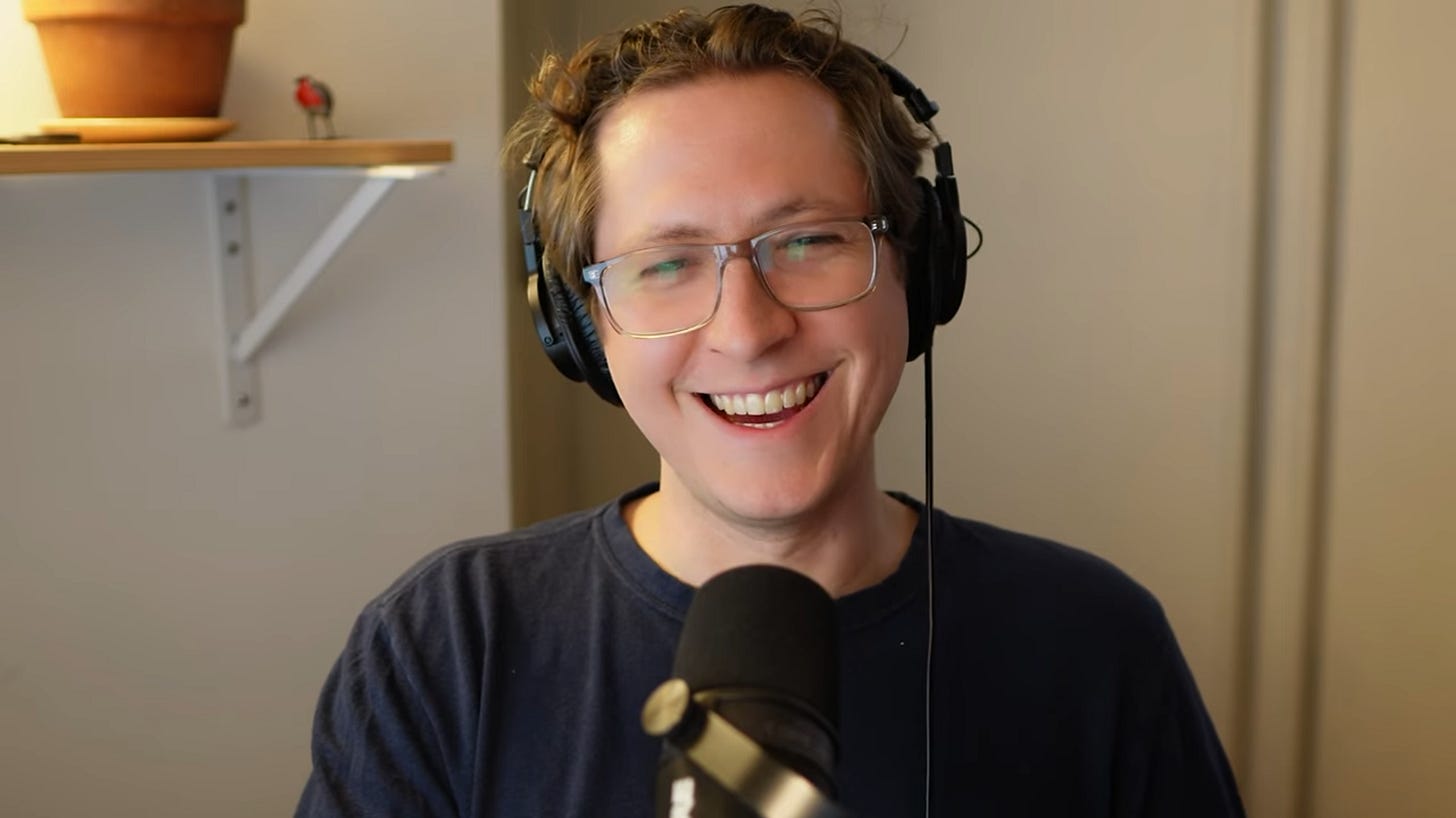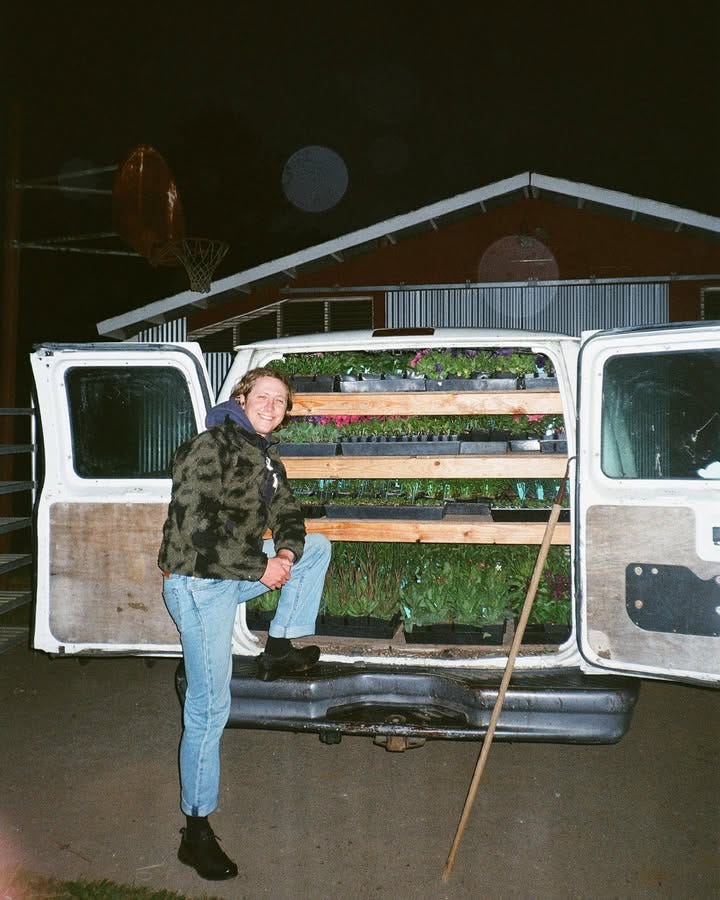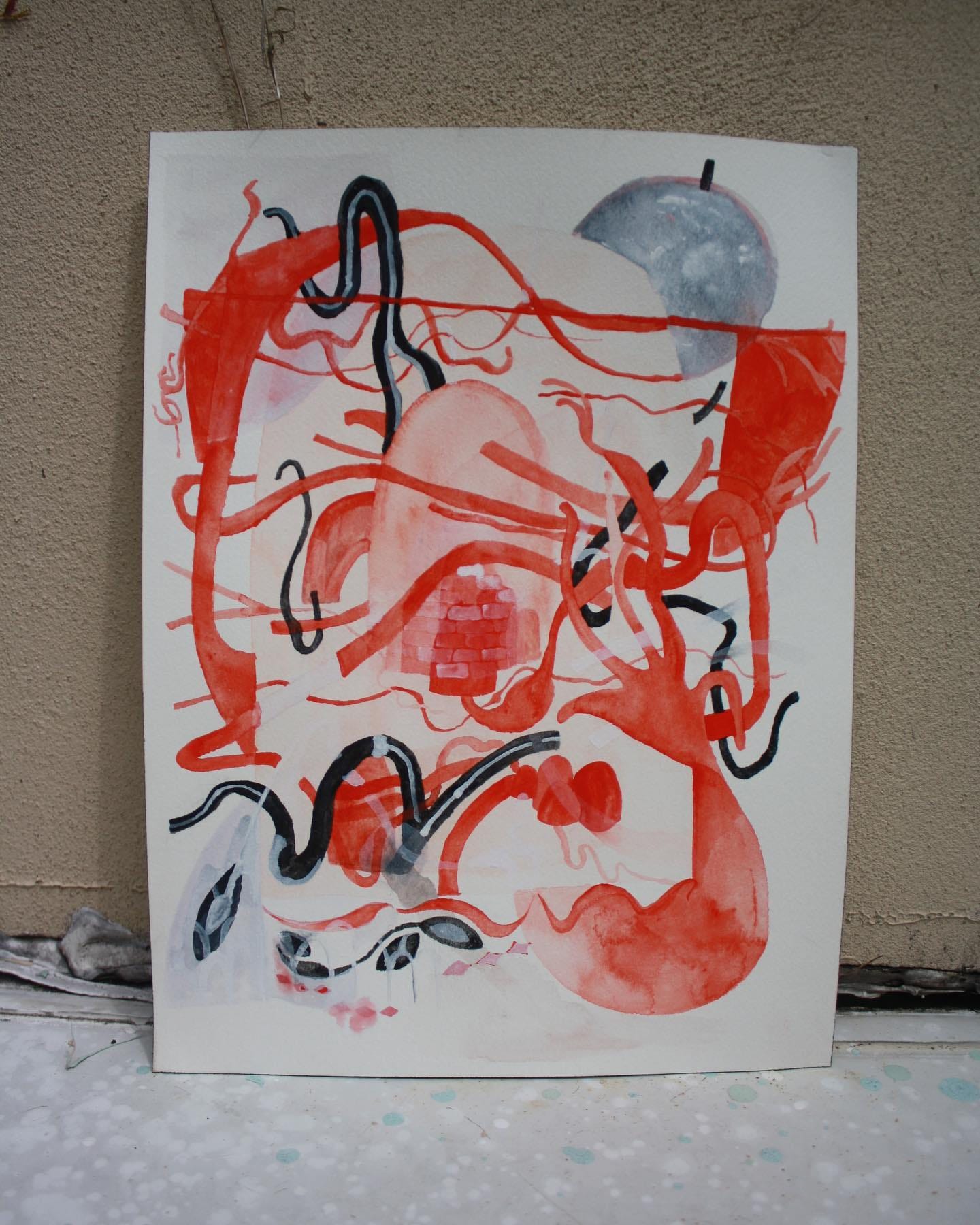Francis Zierer: Creators can learn from cynical capitalists
A conversation with the podcaster and newsletter editor
Welcome to Human Pursuits, the column that features need-to-know names and stories in media and other creative spaces. Today, Creator Spotlight editor and Tasteland co-host Francis Zierer on the connection between new media and hospitality, how to make money as a creator, and the tactic every creative should steal.
Few people have studied the creator economy as thoroughly as Francis Zierer.
A newsletter editor, who also possesses the gift of gab, Francis has spent the past few years building two properties that offer a 360° view of the modern digital landscape.
Creator Spotlight, the podcast and newsletter produced by tech startup beehiiv, offers interviews and lessons from successful creators across platforms. Tasteland, the podcast he co-hosts with Daisy Alioto, offers a meandering (complimentary) exploration of media, marketing, and technology.
While on paper the two concepts seem slightly at odds – Creator Spotlight is concrete and studious, Tasteland is exploratory and sprawling – both demonstrate his ability to trawl social media for signs of human life and ingenuity. At his core, Francis is a storyteller, even when explaining technical terms like cost-per-acquisition. He’s able to distill boring information into compelling narratives, which is harder than it looks.
We’ve gotten to know each other pretty well over the past year. And so, we had much to discuss.
Our edited and condensed conversation touched on his early days growing up on a farm, his introduction to media, his time painting in New Orleans, whether courses being offered by creators are bullshit, and more.
ES: Do you like being an interviewee? Or do you prefer to be the one asking the questions?
FZ: I'm still not used to it. Up until a couple of years ago, I’d been pretty private on the internet.
I like interviewing people because I can prep questions and have notes in my Google Doc, so that I feel well prepared. I'm a better writer than I am a speaker, and so it can sometimes be intimidating to do interviews because I don't always know what I'm going to say. I like writing because it's thinking, and it's rewriting, and making my thoughts sound perfect. I also lack some message discipline. I don’t have points I'm going to hit.
There's a hospitality aspect to interviewing people, too, which I like, where you’re helping them sound their best. I do that research so that I can ask questions that set people up for success.
ES: You have a background in hospitality. Do you think that gave you transferrable skills for working in this new media ecosystem?
FZ: Definitely. My first job was working for my parents. They have a small farm, and when I was about 13, I started working at the farmers' market with them. That involved a very specific kind of small-town hospitality, where you see the same people every week, and you’re representing a family business. I was representing my family, and my approach was rooted in my understanding of that fact.
I also worked in kitchens and as a barista, and I think each of those jobs involved talking to people. There are so many personalities working in a kitchen. It's a weird place to work. I was a dishwasher to start. The lowest rung on the ladder. It helped me develop a sense of humor and an ability to shake things off without getting annoyed.
And working as a barista, you get a mix of customers. Sometimes they're an asshole, or sometimes they don't tip, but you have to be nice to them until they leave, and then you can go shit talk them with your coworkers when the cafe is empty. But I learned to have an ever-present smile. That helps me, I think.
ES: What was your family selling at the market?
FZ: It’s changed over the years. When I was born, my parents were selling a lot of flowers. But as my sister and I got older, my parents thought it would be good to move somewhere more populated. We moved to the West Coast, and they got a new farm and started selling more produce. It's easier to make a living selling produce. We also had a nursery.
When I was a teenager, we sold a lot of vegetable starts. Six packs of vegetables. We’d sell eight six-packs for $20. We sold a lot of lavender. And sunflowers, which are always one of my favorites. When I was a small child, I loved running through the sunflower rows that were taller than me. My favorite job was stripping the sunflower leaves, and I remember being in the flower shop with tons of sunflower leaves on the ground, and the smell of that.
Now, my parents sell a lot of dahlias. Kale. All the brassicas do really well where my family is from. Kale, broccoli, cabbage. Those sturdy leafy greens.
ES: Do you miss that lifestyle at all, living in New York City? So many millennials I know seem to subscribe to the idea that they’ll buy a hobby farm one day and work that land.
FZ: I don't really have that fantasy. I do dream about having a place in the woods, but not of being a farmer. It’s really hard work. The reason I live in New York is that I didn't want to be a farmer. My parents worked six and a half, or seven days a week, every week, my entire life. We lived a decent middle-class lifestyle, but there were never savings. We were fine, we ate well, because farmers can trade with other farmers…
I don't know when I started wanting to move to a city, but I was a bookish kid, and then an Internet kid, which made me want to be where the Internet and culture are, which is in cities. I want to have a nice house upstate, or whatever. Someday I would love to be, if not fully free, then free to choose whether to have a place not in a city.
ES: Did you have any early media influences growing up?
FZ: My interest in media is really rooted in my early days as a reader. I was a voracious reader. Like, that's all I did. I never played sports or anything. I just read a lot. So it was books. I wanted to be an author when I was little. Then I became a teenager and got into music blogs, and fashion blogs like Four Pins. I was the opinions editor of the high school newspaper for a year.
ES: Surprise, surprise.
FZ: Laughs. I wasn't some highbrow media person. I remember starting college in 2012 and thinking, “Wow, Vice is so cool.” But I was a rhetoric and media studies major, and I got really interested in Marshall McLuhan. How people were using social media. I did my capstone project on that. By the time I left college, I was thinking I wanted to be a journalist.
Creators can learn a bit from the more cynical, more capitalist, more entrepreneurial people whom they’re so often skeptical of
ES: You've always had a bit of a multidisciplinary approach to everything you do, though. Like, you’re also a painter, right?
FZ: That's right, though I haven’t painted in a while.
After college, I lived in New Orleans for a couple of years. I had taken an intro to oil painting class, and I wanted to write, but I couldn't figure out how to make myself write without the context of being in a class and somebody giving me a prompt. But I realized I could paint. It was easy to make a mark on the paper and then react to that and then react to that and then react to that reaction. So I did that for a while. I was working with watercolors, and then gouache, because I just found gouache to be much more fun to work with.
For two and a half years, I was painting a lot, because rent was cheap in New Orleans. I could work my restaurant job and then return to the 1,100 square foot house I rented with my now-fiancée. I was a thousand dollars a month. It was a beautiful place, and I had a big eight-by-four-foot table that I would do watercolors at every day. Smoke a joint and doodle for hours, get lost in my own world. I stopped when I moved to New York. My free time got overtaken by social life, work, and the lack of space for large canvases. I did manage to sell a couple of paintings to help fund our move here, though.
ES: You talk to a lot of professional creatives. What are some of the best insights you’ve acquired when it comes to making money in the creator economy?
FZ: The 10th interview I did for Creator Spotlight was with Andrew Huang. He's a Canadian YouTuber and musician, in his early forties, and the first way he started making money was by selling his songwriting services on eBay when he was 19. He’s never really had a “real job”. It's all been music. His book has inspired me, in the sense that it’s written from a perspective of the artist-type speaking to someone skeptical of monetizing their work.
Our mutual friend, and my Tasteland podcast co-host, Daisy Alioto, had this tweet that I keep referencing. It’s from a few weeks ago, and she took a screenshot of a newsletter writer who was insulted that a brand had reached out to her to sponsor her work. And Daisy was like, “It's insane that you wouldn't take this money and figure out something to do with it and use it.” You don’t have to just take it for yourself; you can use it to fund people to write something for you, make some graphic design work, or whatever.
I think there's this acceptance of commerce, and that you have to make a living. Most people can't afford to be precious about their work. It’s okay if you want to. But I think there’s a pragmatism that is needed if you’re going to monetize in a real way. I also think creators can learn a bit from the more cynical, more capitalist, more entrepreneurial people whom they’re so often skeptical of. Pure quality of work, of artistry, is not a viable business model on its own for most people. You have to ask yourself, “How do I fund this?” Or, “How do I position this in a way that it can fund me to keep doing more of it?”
ES: You’re involved with two media properties, Creator Spotlight and Tasteland. The former is pretty focused, in terms of offering tactics and insights to creators. The latter is a bit looser. Do you and Daisy have any broader ambitions for Tasteland? Is it something you’re still defining?
FZ: Tasteland started because I was about 17 weeks into doing Creator Spotlight, and I was looking for an intellectual sparring partner. I went to beehiiv’s CEO, Tyler Denk, and said, “I want to do a podcast with somebody so I can explore some of these ideas,” and he told me to do it with Daisy. I'd been a Dirt reader for a few years. I had actually pitched them once a couple of years before and been rejected. But the goal was just to have these conversations, really…
The newsletter As Seen On recommended Tasteland the other day, and wrote, “This podcast perfectly encapsulates my desire to know all things. Of everything I listen to, it has the most range with the most depth. The episodes are long and, at times, seemingly random, so this requires a bit of trust, but the payoff is certain.” It’s sort of a backhanded compliment, but also, she's got us dead to rights.
I used to promote Tasteland more in Creator Spotlight, but I stopped because I realized it was too different. It was too specific for the audience. Creative Spotlight’s audience is there for the education, whereas Tasteland is a little more meandering. I like having the conversation for the conversation's sake. We do want to grow it more, monetize it, but I think we're both so focused on other things that we don't always have the time to get into it more.
ES: A lot of creators are selling courses at the moment. Are those bullshit?
FZ: I've taken one of them through the education stipend at my last job. It was a session a week, for six or nine weeks, with some breakout rooms, etc. And my biggest takeaway was the networking. I did learn some things. But I feel like I am a bit stubbornly anti-course in my own life.
Word counts are an important way of enforcing structure and consistency
Andrew Huang has a couple of music production courses, and I talked to him about this idea that the market is flooded with courses, some of which are probably lower quality. His response was “Well, I put a lot of thought into mine, and I wanted to do it with a partner who would take them seriously.” A lot of people sell hope with no follow-through, but there are probably some good ones out there. I don’t want to throw the baby out with the bathwater. That said, teaching is hard… The best ones are those where it's a cohort-based thing and you meet people and do the learning with them.
ES: You mentioned being a big reader. What books had their claws in you growing up?
FZ: The definitive series for me, in terms of pure volume of pages read from first grade until seventh grade, was the Redwall series.
ES: Oh shit. A little Christian core.
FZ: Laughs. A family friend gave me Mossflower for my birthday in first grade, and I loved it. I began collecting the books. I eventually had them all. I would re-read every one I had every year, from first to seventh grade.
ES: I have not thought about Redwall in a very long time. That's crazy.
My last question for you, then, is that Creator Spotlight has a recurring segment called “Steal This Tactic”. Between your two media properties, what’s one approach that Human Pursuits readers should be stealing?
FZ: In terms of concrete advice, I would say, strict word counts. Right now, the Creator Spotlight newsletter is capped at below 2,000 words. It’s like that old idea that it takes as long to make something as you give yourself to do it. I could have a year to write an essay, or one week. I’m going to write about the same thing but with a different texture. I think word counts are an important way of enforcing structure and consistency.
Francis Zierer is a podcast host and newsletter editor. He lives in New York City.






